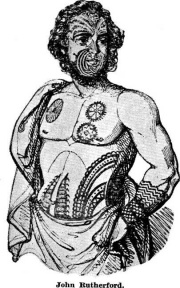John Joyce and John Rutherford: Difference between pages
(Page conversion via llm-mediawiki-rev -jwm) |
(Page conversion via llm-mediawiki-rev -jwm) |
||
| Line 1: | Line 1: | ||
'''John | [[File:Johnrutherford.jpg|thumb|right|180px|John Rutherford]] | ||
'''John Rutherford''' was the first extensively tattooed exhibit from England. Before Rutherford most tattooed exhibitors were either natives like [[Giolo|Giolo]] and [[Omai|Omai]] or sailors with small token tattoos from their journeys. Rutherford, however, was heavily covered with [[Maori|Maori]] tattooing. He was not the first European to exhibit such coverage though—that was the Frenchman [[Jean Baptiste Cabri|Jean Baptiste Cabri]]. | |||
Rutherford did exceed Cabri in his success and fame, mainly due to the elaborate and fanciful tales that he spun to explain his tattooing. As with Cabri's stories they were mostly fictional, but Rutherford seems to have possessed a greater ability to capture his audience's imagination. The basic format of his story would be mimicked for decades to come in an almost formulaic manner. The story consists essentially of a shipwreck or battle with natives, subsequent capture, forcible tattooing (often by native priests), joining native society (often in a position of power) and taking many wives before escape and return to "civilization". | |||
Rutherford first exhibited himself in [[1828|1828]] in Bristol after his alleged 12 year adventure, having left for [[New Zealand|New Zealand]] in [[1816|1816]]. In [[1830|1830]] Rutherford disappeared, it is speculated that he returned to New Zealand. Portions of his tales are recounted in ''The New Zealanders'' by George L. Craik. | |||
Latest revision as of 06:24, 17 September 2023
John Rutherford was the first extensively tattooed exhibit from England. Before Rutherford most tattooed exhibitors were either natives like Giolo and Omai or sailors with small token tattoos from their journeys. Rutherford, however, was heavily covered with Maori tattooing. He was not the first European to exhibit such coverage though—that was the Frenchman Jean Baptiste Cabri.
Rutherford did exceed Cabri in his success and fame, mainly due to the elaborate and fanciful tales that he spun to explain his tattooing. As with Cabri's stories they were mostly fictional, but Rutherford seems to have possessed a greater ability to capture his audience's imagination. The basic format of his story would be mimicked for decades to come in an almost formulaic manner. The story consists essentially of a shipwreck or battle with natives, subsequent capture, forcible tattooing (often by native priests), joining native society (often in a position of power) and taking many wives before escape and return to "civilization".
Rutherford first exhibited himself in 1828 in Bristol after his alleged 12 year adventure, having left for New Zealand in 1816. In 1830 Rutherford disappeared, it is speculated that he returned to New Zealand. Portions of his tales are recounted in The New Zealanders by George L. Craik.
